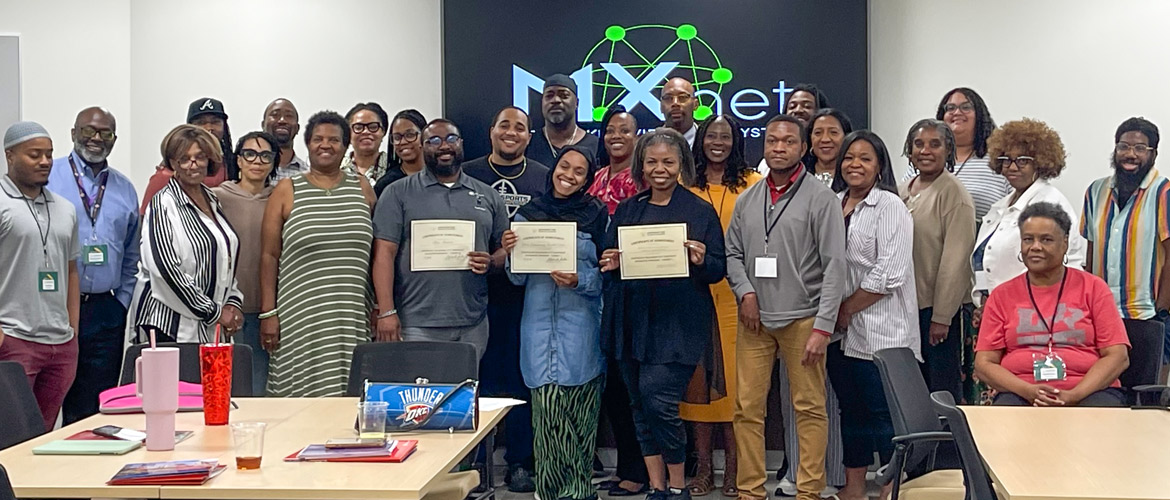Almost 15 years ago, Darron Lamkin launched the nonprofit Class Matters to help young people in Oklahoma City’s underserved Northeast community develop and grow as leaders or consider becoming an engineer just like him.
Targeted to kids with academic and behavioral challenges, the organization routinely recruited dozens of members to participate in science, technology, engineering and math programs. But Lamkin had been spending thousands of dollars of his own money on the organization rather than fundraising — a business model that limited Class Matters’ potential.
“I wanted to figure out a way to help more kids and generate more revenue,” says Lamkin, who earned a bachelor’s, two masters’ and a doctoral degree from Oklahoma State University. “I knew there was a better way to do things, and there’s always more to learn.”
At the suggestion of another community organization founder, Lamkin joined the Northeast Oklahoma City Nonprofit Incubator to discover how to extend Class Matters’ capacity and improve the community. In 2023, fundraising professionals Gabrielle and Stephen Butler launched the incubator to train and mentor Black-led organizations and those focused on Northeast Oklahoma City to benefit their communities.
“What we discovered as patrons and from the boards we were sitting on was that there is a lack of resources going to Northeast Oklahoma City,” Gabrielle Butler says. “There are tremendous opportunities, and the nonprofits that serve the community know what they are doing, but they can’t move their missions forward.”
A $65,000 Blue Impact℠ grant from Blue Cross and Blue Shield of Oklahoma will help support the incubator and lead nonprofits to sustainability and growth. During 13-week sessions, incubator participants receive training, strategic planning assistance, mentorship and connections to philanthropic leaders.
“Our goal is to help create equity and opportunity,” says Stephen Butler, by teaching participants about things like board governance, development, accounting and marketing. “They’re the subject matter experts in their communities and among their constituencies, but they are not treated as experts.”
In Oklahoma City, more than 900 nonprofits are so small they don’t employ anyone. An estimated 1,700 earn less than $250,000 in revenue annually, according to Cause IQ, a nonprofit data repository.
“Nonprofits are critical, especially in underserved areas,” Gabrielle Butler says. “They have been leaving so much potential on the table because of a lack of resources.”
After working as fundraisers for organizations across the country, the Butlers returned to their native Oklahoma, vowing to help strengthen Northeast Oklahoma City’s social safety net by training the community’s next generation of nonprofit leaders. The incubator focuses on organizations with annual revenues less than $500,000. Preference is given to organizations that have operated at least five years.
After completing the program, participants receive paid membership in the Greater Oklahoma City Chamber of Commerce, Oklahoma City Black Chamber of Commerce and Oklahoma Center for Nonprofits to build their skills. Additionally, they receive up to five hours of follow-up mentoring, as much as $5,000 for strategic planning development and one year of bookkeeping services.
BCBSOK became the incubator’s first corporate funder. With the Blue Impact grant program, BCBSOK awarded 22 Oklahoma nonprofits more than $993,000 in 2024. The program invests in organizations working to address social and economic drivers of health, including economic opportunity and stability.
“Investing in capacity building for small nonprofits in northeast Oklahoma City is an exciting opportunity for Blue Cross and Blue Shield of Oklahoma,” says Brooke Townsend, BCBSOK’s community affairs director. “Through this Blue Impact grant, we are supporting the growth of critical organizations that have relationships and cultural relevance in a historically underserved area of the community. The economic and employment opportunities provided through this work will have a positive lasting impact.”
Since finishing the incubator, Lamkin says philanthropists have reached out to him to learn more about Class Matters. He also was invited to a few corporate golf matches where he met new people and potential funders.
“The incubator not only increased the visibility of Class Matters it also increased the validity of the work I’m doing,” says Lamkin, recognized nationally for his commitment to introducing young people to science, technology, engineering and math. “The Oklahoma Center for Nonprofits gave me so many tips on strategy and how to talk to banks.”
Participation in the incubator is helping him overcome one of his biggest challenges — fear of fundraising.
“I learned how to tell my story to potential funders and be okay with doing it,” Lamkin says. “You learn that it doesn’t make you less or weak when you allow people to help you.”

